Your Vaginal Microbiome Is More Complex Than You Know

Vaginal microbiome, sometimes referred to as "vaginal flora," is the broad name given to the microorganisms that colonize the vagina.
"Good" bacteria that help the body fight infection inhabit every opening into your body. For example, your nasal microbiome helps protect against inflammation and allergies. Similarly, your vaginal microbiome helps protect you from any bacteria that are not supposed to be there.
'Normal' vs. 'abnormal'
Everyone is different—and so is every individual's vaginal flora. However, the element that most consistently should be present in a vaginal microbiome is the type of bacteria. A "normal" vaginal microbiome has a plethora of bacteria, predominantly Lactobacillus, said Kecia Gaither, M.D., Director, Perinatal Services, NYC HEALTH + HOSPITALS/Lincoln in the Bronx.
"This bacterium is responsible for producing antimicrobial compounds such as hydrogen peroxide, lactic acid, and bacteria-killing compounds," Gaither said. "These aid in maintaining a balanced vaginal pH as well as keeping pathogens at bay. Some of these pathogens may include bacterial vaginosis, Candida [yeast infection] and PID [pelvic inflammatory disease]."
The vaginal microbiome fluctuates due to a variety of factors:
- Age
- Stage of menstrual cycle
- Hormone levels
- Stress
- Pregnancy
- Sexual activity
- Diet
- Products and substances used in and around the vaginal area, such as washes, lubricants, douches, menstrual products and semen
Gaither explained these differences are often caused by genetics, immune competence and nutrition, among other factors. So although certain classes and species of bacteria are expected to be present in all vaginas, the exact ratio and diversity of bacteria differ from person to person.
Beware of these practices
In addition, certain practices could also shift the microbiome by causing changes in the vaginal pH, according to Cindy M. Duke, M.D., a board-certified OB-GYN, fertility doctor and virologist in the Las Vegas area. This is important because pH fluctuations can lead to bacterial overgrowth and, therefore, infections, she explained.
Some of the practices that can lead to an overgrowth of bacteria include:
- Anal intercourse immediately followed by vaginal intercourse (without cleaning or replacing the condom in between)
- Wiping from back to front (as this may cause fecal matter to make its way into the vagina)
- Douching
It's sometimes thought that douching prevents an overgrowth of bacteria. However, Nichole Butler, M.D., board-certified OB/GYN, FACOG at Weiss Memorial Hospital's Women's Health Center in Chicago, said this is a misunderstood phenomenon.
"I try to tell my patients to refrain from putting cleaners in the vagina because it's not necessary," she said. "These rinses often create an imbalance in the vaginal flora, which can then predispose you to infection."
Look for warning signs about your microbiome
Your vaginal microbiome requires a delicate balance, and Duke said something might be out of sorts if you experience any of the following symptoms: change in odor or discharge color, itching, and vaginal pain, swelling or bleeding.
If you have any of these symptoms or notice anything else "off" with your vagina, you should see your doctor. You could be suffering from a yeast infection, bacterial vaginosis or some other vaginal condition.
Emerging research on the vaginal microbiome
Vaginal microbiomes are very important and play a significant role in vaginal health. Yet, as Gaither shared, not enough research exists concerning the full effects of the vaginal microbiome.
"For example, there has been a correlation made between low levels of Lactobacillus with an increased risk of preterm delivery," Gaither said.
This is a result of pathogens ascending into the uterus and weakening the protective membranes, causing their premature rupturing and subsequent preterm delivery, she explained.
But research is being conducted to help understand and, therefore, prevent such outcomes. In 2019, the University of Maryland School of Medicine developed a tool called VIRGO, also known as a human vaginal nonredundant gene catalog.
"VIRGO offers a convenient reference database and toolkit to facilitate a more in-depth understanding of the role of vaginal microorganisms in women's health and reproductive outcomes," the university website states. The hope is a tool such as VIRGO will help speed up discoveries into treatment options and diagnostic tests for vaginal conditions.
Additionally, studies such as the Human Microbiome Project have shed light on the plethora of microbes that inhabit the human body to keep it healthy, and how crucial it is to maintain overall health so our body's microbiomes continue to operate optimally. Of course, this applies to vaginal microbiomes, too.


















